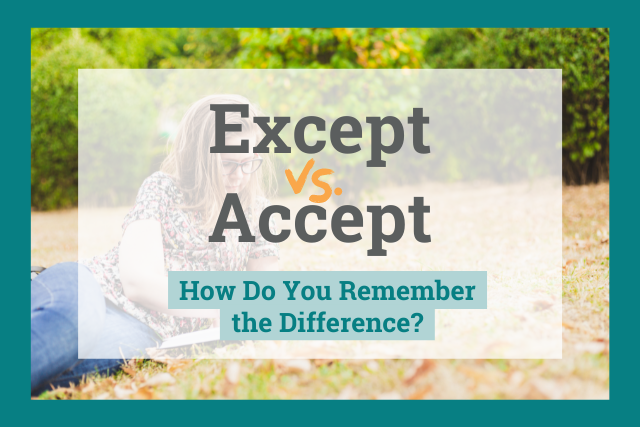
Accept and except are part of the homophone family. Homophones are two words that sound the same but have different spellings and meanings.
For this reason, accept and except are sometimes confused with one another, even by writers who speak English as their first language.
Homophones can be great when you use them intentionally for some clever word play! But they can also be sneaky, showing up so stealthily that you don’t realize you’ve used the wrong word and publish an error.
While some homophones cause more trouble than others (affect and effect, for example), others are easier to manage. Accept and except fall into the latter category.
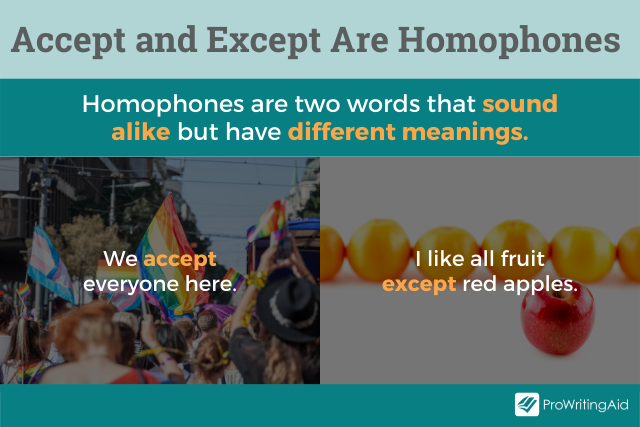
What Does Accept Mean?
Accept is a verb and only ever a verb. Of the two words in this pair of homophones, accept is the one less likely to give you any trouble, thanks to its singular part of speech.
Accept has several meanings, but you’ll see they are related to the general concepts of allowing or receiving.
Merriam Webster includes the following as definitions for the verb accept:
To receive something willingly
- Please accept this token of my thanks.
- She accepted the proposal.
- I cannot accept a drink from a stranger.
To give admittance or approval to
- Were you accepted into your top-choice college?
- Look how the dog accepts the orphaned kitten as one of its own!
- I cannot accept that type of behavior in the classroom.
To endure without protest
- You do not have to accept these working conditions.
- Why did they simply accept such rude treatment?
- He accepted the consequences of his actions.
To recognize as true
- I accept your explanation.
- Your parents will not accept your crazy explanation for breaking curfew.
- That interpretation of the research is a distortion. We cannot accept your conclusions.
While there are nuances, or slight distinctions among the definitions of the verb accept, they share a common theme or concept of reception.
Essentially, accept means “giving the okay” to something or someone.
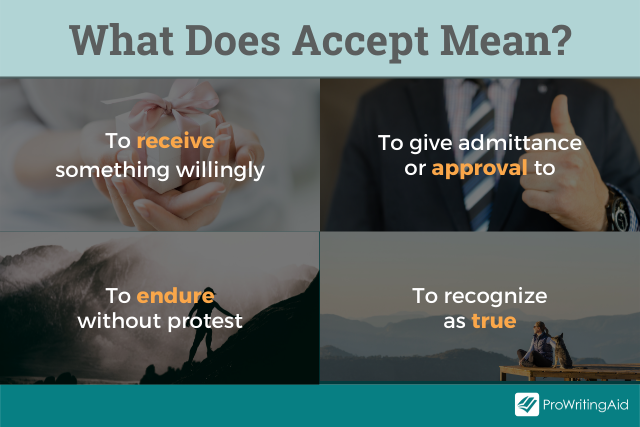
What Does Except Mean?
Except is a little more unruly than accept, but still quite manageable. It can take the role of preposition, conjunction, or (less commonly) verb.
But—its first two letters, ex, provide a bit of a clue to its meaning, which contrasts with the definition of accept.
When you think of except, think of the “ex.” An ex is someone or something that is usually left out of your life—they are excluded.
They are not “given the okay.” The definitions and uses for except relate to that concept of exclusion.
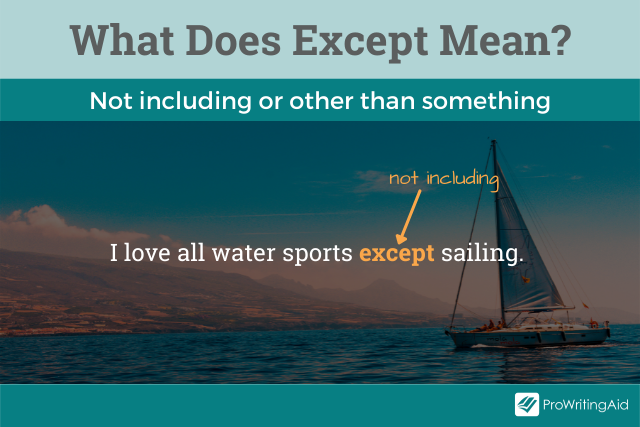
Except as a Preposition
A preposition is a word that works with a noun phrase usually preceding it, with the purpose of showing direction, location, time, or spatial relationships, or to introduce an object.
Examples of prepositional phrases are:
- In the house
- After the bell rings
- Near the building
As a preposition, except means “not including,” “but not,” or “other than.”
- I like them all except the green ones.
- They've visited every state except Alaska.
- It rained every day except Friday.
- We haven’t told anyone except the family.
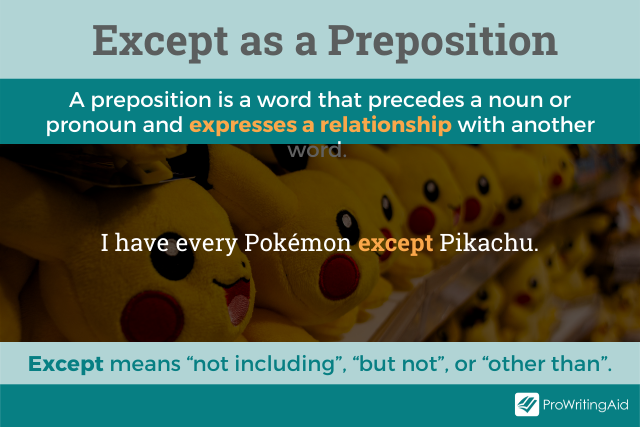
Except as a Conjunction
When used as a conjunction, except can mean:
- Only
- Under any other condition than
- With the exception of
A conjunction is a word that joins or shows a relationship between words, phrases, or clauses. When used as a conjunction, except is often followed by “that” or “for.”
- I had the same shoes as her except mine were red.
- We can go in any weather except for torrential rain or blinding snow.
- The twins look exactly the same except that one has longer hair than the other.
- I don’t really enjoy snow, except when I want to go skiing.
So far so good, right?
Accept is a verb and except is a preposition or a conjunction. Those are easy distinctions.
Plus, accept generally means “to receive or take in,” while except means “to exclude or leave out.”
Their meanings and functions don’t overlap and except’s spelling even provides an obvious clue to its use!
So, as far as homophone pairs go, accept and except are fairly distinct in form and meaning ...
Except for when except can also be used as a verb. I know, we were so close!
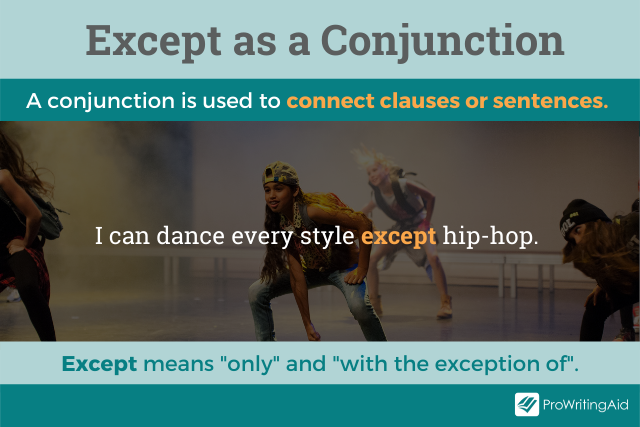
Except as a Verb
Of all of its possible parts of speech, the verb form is the least common use of except. But it isn’t completely uncommon.
As a verb, except means to exclude—to leave out. Sound familiar?
- They excepted their former friends from the guest list.
- I’m frustrated with everyone involved, present company excepted.
- Can they except you from the mandate since you have unique circumstances?
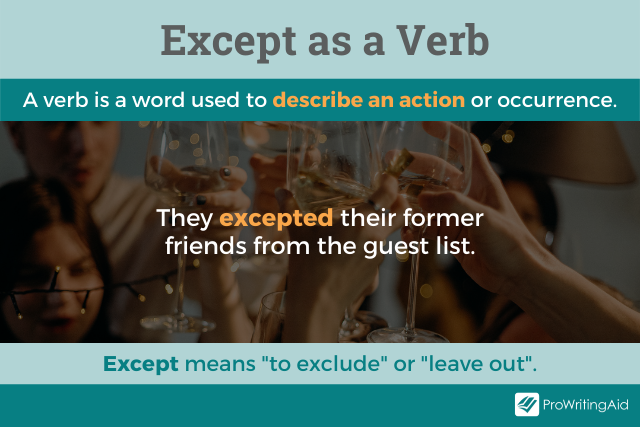
Remember the Difference Between Accept and Except
Let’s review what we know about accept and except so that you can use them confidently and without error in your writing.
Accept
- Is only ever a verb
- Means to “receive” or “affirm,” or “give the OK” to
Except
- Can be a preposition
- Can be a conjunction
- Can be a verb (though, this is less common)
- Means “but not,” “only,” “under any other condition than,” or “to exclude”
- Has a spelling that provides a clue to its meaning
Bottom Line
- Accept and except have very different meanings—opposite meanings, in fact.
- Accept and except usually represent different parts of speech; just be mindful of that verb form for except!
If you still find yourself making errors when using these homophones, I have two suggestions.
- Use the ProWritingAid Homonym Report (which also covers homophones)! Its job is to alert you when you’ve used a commonly confused word, and help ensure that you select the correct one.
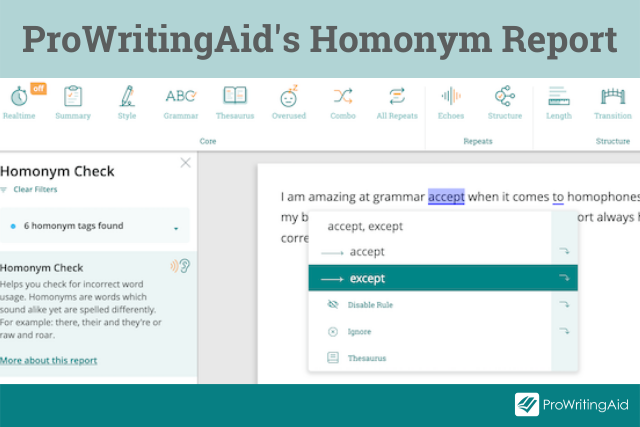
- Keep practicing! I’ve got you covered with some practice sentences in the next section.
Accept or Except? A Final Review
Should you use accept or except in these sentence examples?
Will you _ _ _ _ _ _ my apology? I’m truly sorry.
I can meet any day this week _ _ _ _ _ _ for Monday.
Because the employee had an emergency, the manager _ _ _ _ _ _ her from the staff meeting.
My dog is spoiled. He will not _ _ _ _ _ _ any treats that aren’t his favorite brand.
Do not _ _ _ _ _ _ that deal! They are ripping you off!
Babies are so adorable, _ _ _ _ _ _ when they refuse to sleep!
_ _ _ _ _ _ for Joe, everyone has responded to the invitation.
All of the stores are well stocked, _ _ _ _ _ _ this one.
Grandma was so happy to _ _ _ _ _ _ my gift.
We might believe your testimony, _ _ _ _ _ _ that we already have proof that you’re lying.
Answers: 1.Accept; 2. Except; 3. Excepted; 4. Accept; 5. Accept; 6. Except; 7. Except; 8. Except; 9. Accept; 10. Except


